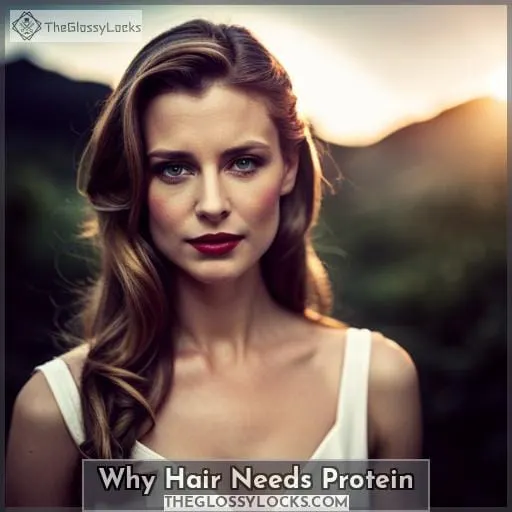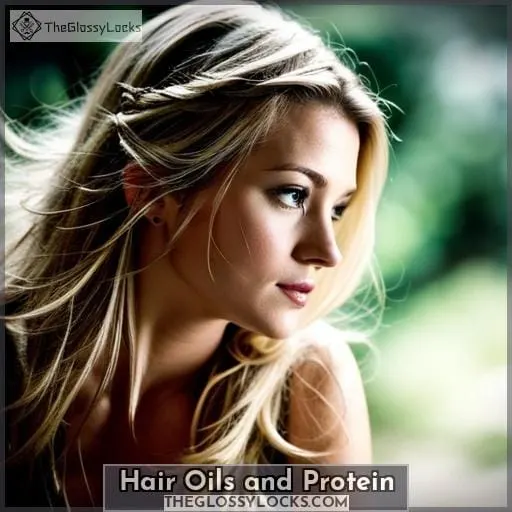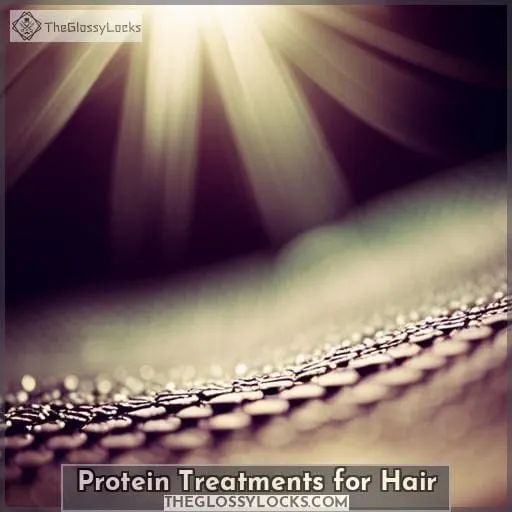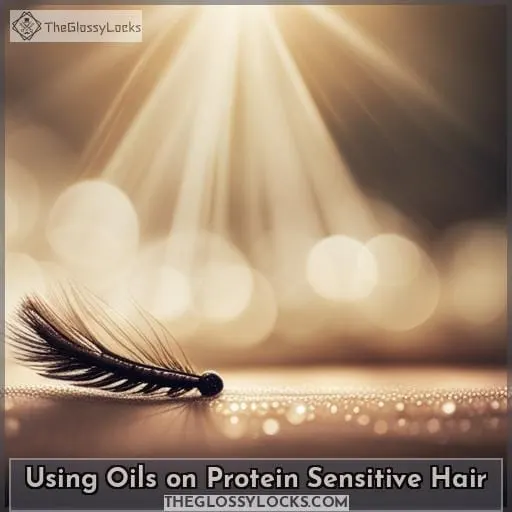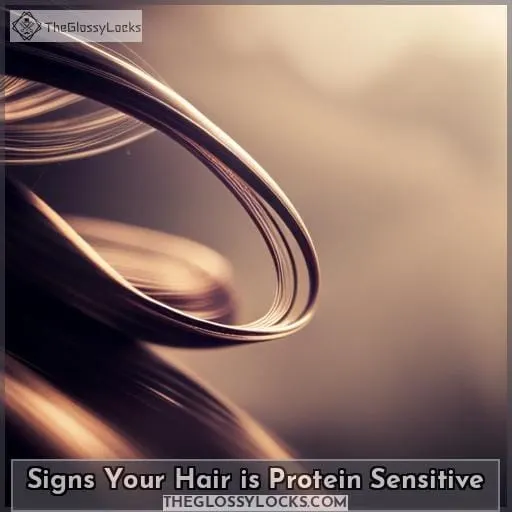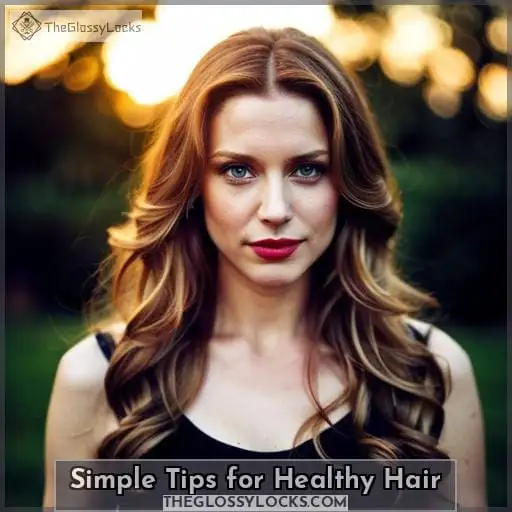This site is supported by our readers. We may earn a commission, at no cost to you, if you purchase through links.
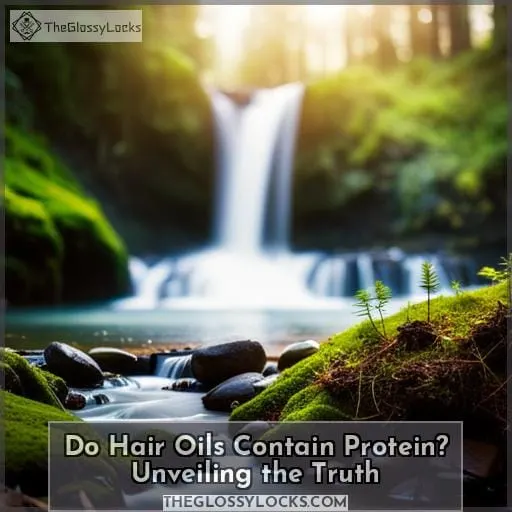 Feeling perplexed about protein in hair oils? Don’t worry – the truth is here!
Feeling perplexed about protein in hair oils? Don’t worry – the truth is here!
Hair proteins are essential for strength, protection, and reducing breakage. Though many oils contain no protein at all, a few have an affinity to it that helps protect from keratin breakdown.
Learn how different types of oil affect protein-sensitive hair and when it’s time to see a specialist for optimal health results.
Let us unravel the mystery behind ‘Do Hair Oils Contain Protein?
Table Of Contents
Why Hair Needs Protein
You might wonder why your hair needs protein. Well, it’s all about strength, protection, and reducing breakage.
Hair proteins are like the building blocks that make your hair resilient and less prone to damage.
In the upcoming sections, we’ll explore the vital role of protein in maintaining healthy and gorgeous locks.
Strengthens Hair
To strengthen your hair, it relies on the essential role of proteins. While oils offer many benefits for hair strength, they aren’t a direct source of protein.
The science behind how oils strengthen hair strands lies in their ability to seal in moisture and smooth the cuticle, preventing breakage. Oils can be used in various ways to enhance hair strength, such as applying them to clean damp hair or mixing them into deep conditioners.
Contrary to popular belief, not all hair oils contain protein – this is a myth that needs debunking.
Protects Hair
Protein is essential for hair health and plays a vital role in protecting your strands. It promotes shine, boosts elasticity, seals moisture, adds nutrition, and repairs damage.
While hair oils don’t contain protein themselves, they can still protect your hair by providing nourishment and hydration. Oils like camellia oil moisturize the strands while olive oil helps retain protein and moisture.
Avocado oil softens the hair while hemp seed oil provides smoothing effects. Argan oil repairs damage and adds shine to your locks.
| Oil | Benefits |
|---|---|
| Camellia Oil | Provides moisture & strength; reduces breakage |
| Olive Oil | Helps retain protein & moisture |
| Avocado Oil | Softens & moisturizes hair |
| Hemp Seed Oil | Moisturizing & smoothing |
| Argan Oil | Repairs damage; provides shine |
By incorporating these beneficial oils into your routine, you can enhance the protection of your tresses against external factors that may cause damage or dryness.
Reduces Breakage
Using a keratin protein treatment, you can reduce breakage in your hair by incorporating proteins into your hair care routine.
The keratin treatments fill in gaps and holes in the hair cuticle, allowing hair to retain more moisture and increasing strength.
By protecting hair from friction and combing forces, the added proteins reduce how often hair strands snap and break off.
While oils offer many nourishing benefits, only proteins can truly reinforce hair itself against damage and daily stresses that cause breakage.
Hair Oils and Protein
Here we explore the crucial question of whether common hair oils actually contain protein.
Coconut, argan, olive, and avocado oils don’t inherently include protein since they’re composed of fat molecules. However, these natural oils still help strengthen hair through unique mechanisms unrelated to external proteins.
Coconut Oil
However, didn’t coconut oil strengthen and repair hair by mimicking protein?
Using oils like coconut on protein-sensitive hair seems counterintuitive.
Coconut oil doesn’t actually contain protein – its fatty acids just superficially coat hair to mimic protein’s effects.
While coconut oil benefits all hair types with moisturizing properties, rely on true protein treatments sparingly if hair is protein-sensitive.
Oils like olive, camellia, or argan provide similar hydration without protein fears.
Focus on maintaining moisture balance.
Argan Oil
You’d know that while coconut oil can mimic some protein effects, argan oil strengthens hair through different mechanisms.
Rich in fatty acids and vitamin E, argan oil repairs damage and provides intense moisture.
Massaging small amounts of argan oil into your hair and scalp boosts shine and manageability without weighing hair down.
Argan’s nourishing properties make it an ideal oil for conditioning hair overnight or using as a daily styling serum.
Olive Oil
Your bottle of olive oil provides hair with moisture and strengthens strands while reducing breakage. Olive oil’s fatty acids penetrate to condition hair from within. It mimics hair’s natural oils, boosting shine.
While not an identical protein replacement, olive oil supports protein bonds and softens your hair, preventing damage.
Focus on olive oil’s proven benefits, not misplaced protein fears.
Avocado Oil
You’ll find avocado oil softens and moisturizes hair while being protein-free. Its vitamin and antioxidant content nourish hair.
The rich texture absorbs into dry, damaged strands to restore elasticity. Massage avocado oil into your ends before washing or add to masks for extra conditioning.
Use it lightly to avoid weighing hair down.
Avocado oil’s moisturizing abilities make it a versatile choice without unnecessary protein concerns.
Protein Treatments for Hair
Many options exist for restoring protein to hair.
Salon keratin treatments deeply penetrate protein inside the cortex.
At-home protein treatments and DIY options like gelatin also coat hair with protein.
Salon Keratin Treatments
You’ve likely heard of salon keratin treatments, professional hair smoothing procedures that use protein to temporarily straighten or relax curls.
Before deciding on a keratin treatment, consider:
- Feeling confident about your natural hair
- Understanding the financial and time commitments
- Considering potential damage from overprocessing
Rely on your intuition to determine if a keratin treatment aligns with your hair goals and self-care practices.
Seek stylist guidance to minimize risks.
Ultimately embrace your hair’s unique beauty and manageability.
At-Home Protein Treatments
Certain DIY protein treatments can temporarily strengthen your hair and reduce breakage when used properly. With homemade masks, be cautious and start with lower protein levels to avoid overloading sensitive strands.
Look for gentle plant proteins like rice or oat. Always deep condition after and focus on maintaining balance, not overdoing protein.
Hair resilience relies on the right ratio of protein to moisture. Avoid assuming oils boost protein; nourish strands with protein-free oils instead.
DIY Protein Treatments
Quite a few protein treatments you can make at home effectively strengthen and repair damaged hair.
Whisking eggs or greek yogurt into your hair masks provides an easy protein boost.
For deeper nourishment, mix gelatin powder with coconut milk and apply.
Adding amla powder to oils offers conditioning amino acids without being overwhelming.
Focus on gentle, nourishing ingredients to boost hair health.
Customize homemade remedies based on your hair’s specific needs.
Using Oils on Protein Sensitive Hair
When it comes to using oils on protein sensitive hair, many misunderstandings arise.
A well-formulated oil treatment replenishes moisture, balances protein levels, and strengthens hair from within.
Protein sensitivities often revolve around moisture balance. If hair lacks enough moisture, the effects of protein treatments become amplified.
Oils help restore that equilibrium with deep conditioning. They also mimic protein’s protective effects.
Avoiding oils due to protein fears actually deprives hair of needed nourishment. Focus instead on selecting the right oils for your needs and using them properly.
With oil treatments, even the most protein sensitive hair can thrive. Gentle oils offer protein sensitive hair a natural solution.
Signs Your Hair is Protein Sensitive
Your hair’s signs of protein sensitivity include straw-like strands, mushy elasticity, and inability to hold a curl. Common misconceptions about hair oils can lead protein sensitive types to avoid natural options like coconut or olive oil.
Focus instead on signs in your own hair texture. Does your hair become brittle and snap when you apply protein treatments? Do your curls go limp instead of springy?
Protein-free oils can provide needed moisture without worsening issues. Adjust your hair care routine to include more conditioning oils if your hair shows signs of protein sensitivity. Tailor your approach to nourish strands based on your unique needs, not assumptions about whether hair oils contain protein.
What matters most is caring for your hair’s health and beauty.
Simple Tips for Healthy Hair
To maintain healthy hair, follow these simple tips:
- Deep condition regularly: Deep conditioning is essential for providing your hair with the moisture and strength it needs. Make sure to use a deep conditioner that suits your hair type and apply it from roots to ends.
- Limit heat styling: Excessive heat can damage your hair, making it weak and prone to breakage. Try reducing the use of hot tools like straighteners or curling irons, and opt for air-drying or using low-heat settings instead.
- Be gentle with your hair: Avoid rough handling or aggressive brushing as this can cause unnecessary stress on your strands leading to breakage. Detangle starting from the ends up using a wide-toothed comb or brush specifically designed for wet/dry detangling.
- Trim regularly: Regular trims help maintain healthy-looking locks by preventing split ends from traveling up the shafts of each strand resulting in weaker overall health.
Following these tips will ensure that you’re taking proper care of your precious tresses, promoting their healthiness so they can shine bright!
When to See a Specialist
Now that you have learned about simple tips for maintaining healthy hair, it’s important to know when it’s time to see a specialist.
While taking care of your hair on your own is essential, there may come a point where professional help is needed. If you’re struggling with persistent scalp issues such as dandruff or itchiness that don’t improve with over-the-counter treatments, it may be time to consult a dermatologist who specializes in hair and scalp health.
Additionally, if you find yourself constantly battling dryness or excessive breakage despite using the right products and following proper care routines, seeing an expert can provide valuable insight into finding the root cause of these problems and recommend targeted solutions like pre-shampoo treatments or safe heat styling techniques.
Furthermore, if you notice significant damage to your ends despite efforts to maintain their health through regular trims and conditioning practices, seeking guidance from a specialist can help prevent further deterioration.
Remember that investing in professional expertise can lead to a better understanding of your unique needs while helping you achieve optimal results in caring for your precious locks.
Conclusion
As the saying goes, ‘you are what you eat’ and this applies to your hair too! To keep your hair healthy and strong, incorporating protein into your hair care routine is essential.
From salon keratin treatments to at-home DIY protein treatments, there are plenty of options to choose from. However, if your hair is protein-sensitive, you may want to opt for oils like coconut oil, argan oil, olive oil, or avocado oil.
If you’re unsure whether your hair is protein-sensitive, look out for signs such as dryness, brittleness, and breakage.
With these tips in mind, you can now confidently keep your hair looking and feeling its best.

